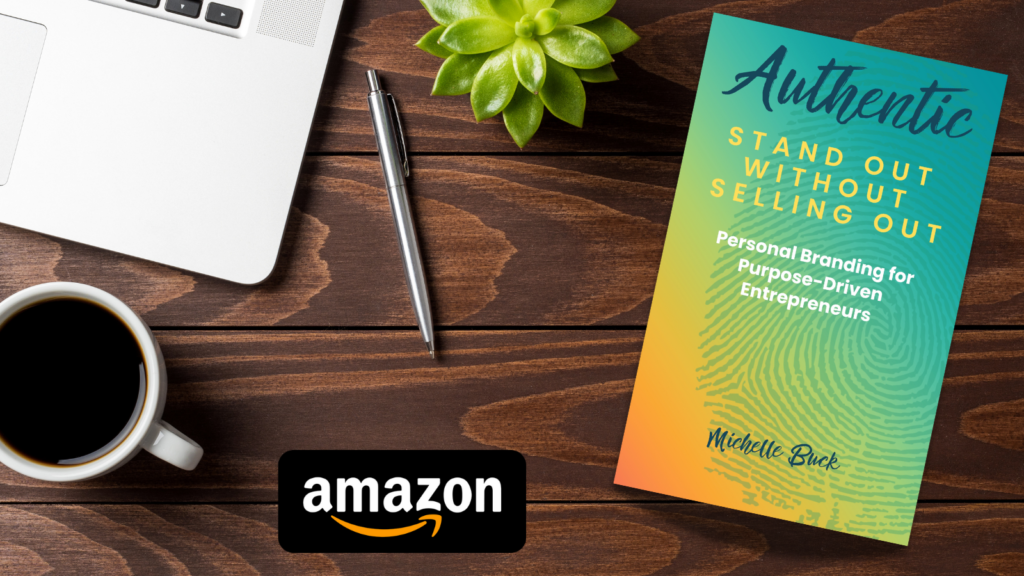by Michelle
Share
by Michelle
Share

Recently, the “author swap” topic hit my doorstep and had me in research mode. Even though I’ve published three books so far, I still don’t know everything. I’ll be the first to admit, I’m on a journey and I’m not an expert. This post will address the rabbit trail of author swaps so we can learn together.
What Sparked This Conversation?
Yesterday, I was emailing back and forth with another author who had asked a group of us if we’d review her book. I agreed and then mentioned that I had a book out as well, with no pressure if she wanted to grab a copy and let me know what she thought.
Her response? That my suggestion was unethical.
This struck me as odd because, well, my entire audience consists of authors – whether they’re business owners, coaches, or freelancers. If author swaps are unethical, then that would mean I shouldn’t be reading their books and they shouldn’t be reading mine (or at least not in exchange). This left me wondering about the boundaries of author relationships in the self-publishing world.
What Exactly Is an Author Swap?
For those who aren’t familiar, an author swap is simply a reciprocal arrangement between two writers. This could involve:
- Reviews (the most controversial type)
- Newsletter features
- Guest posting
- Podcast appearances
- Social media shoutouts
These collaborative practices are the backbone of indie publishing marketing. In a world dominated by algorithms and ads, personal connections remain our most powerful promotional tool.
The Amazon Guidelines Dilemma
Amazon does have some specific guidelines about reviews that are worth noting:
- No reviews as part of promotional arrangements
- No reviews where there’s a conflict of interest
- No exchanging anything for compensation
The tricky part is that “compensation” can include reciprocal review agreements. So technically, if Amazon discovers that authors are explicitly agreeing to review each other’s books, those reviews could be removed.
Violation consequences can range from content removal to account limitations—and in worst-case scenarios, account termination (which nobody wants!).
Available Now! Authentic: Stand Out Without Selling Out
Grab my new book and learn how to use personal branding for your business! A step-by-step guide for standing out authentically instead of trying to fit in.
Ethical vs. Unethical Practices for Author Swap
Let’s break down what’s generally considered okay versus what’s definitely crossing a line:
Ethical Approaches
- Cross-promotion between authors
- Authentic reviews without requirements for star ratings
- Legitimate audience sharing (no strings attached)
Unethical Practices (Definitely Avoid These!)
- Buying reviews
- Paying for ARC reviews
- Reimbursing book purchases to get sales or reviews
The Self-Publisher’s Challenge
Here’s the conundrum every self-published author faces: you need reviews to establish credibility. Potential readers want to see that others have enjoyed your book before they commit to buying it.
Without some strategy for obtaining those initial reviews, you’re stuck in a classic catch-22. The reality is that maybe only 5% of people who download your book will leave a review. I recently ran a free promotion through Freebooksy and got around 1100 downloads—if I’m lucky, that might translate to 55 reviews. But from experience, I’m thinking it’s going to be much lower. I’d be surprised if 10 people reviewed my book from that promotion.
Alternative Marketing Strategies
If you’re concerned about author swaps or want to diversify your promotional efforts, here are some alternatives:
- Content marketing: Create valuable blog posts that mention your book but aren’t solely promotional
- Book blogging and podcast appearances
- Library outreach programs
- Book fairs (especially great for children’s books)
- Local author events and writing groups
- Facebook and Goodreads reader groups (always check their rules first!)
- Create shareable content related to your book’s theme
- Build your email list organically
- Explore platforms like StoryOrigin, Substack, and Gemsy
My Personal Take on the Author Swap
I believe authenticity is key when promoting your books. Creating genuine connections with readers and fellow authors should be your primary focus—not stressing over whether Amazon will scrutinize every interaction.
Rather than trying to game the system with questionable tactics (like those “hacks” some people suggest for artificially boosting Amazon rankings), concentrate on building a sustainable author platform based on real relationships.
The ethical line gets crossed when:
- Money changes hands for reviews
- You demand specific ratings in exchange for your support
- You create quid pro quo expectations rather than genuine recommendations
The key is in your approach and intentions. Be thoughtful about how you phrase your requests, and always make it clear that honest opinions are what you’re after and never require anything from your reader (author or not).
What About Amazon? Why Some Authors Choose to Boycott
Speaking of ethics in publishing, you might have heard about authors and readers boycotting Amazon altogether. Honestly, I think Amazon is a bit hypocritical and my experience working with them in corporate jobs where we used them to sell products was eye-opening. They really don’t care about sellers, and that includes authors.
So yeah, let’s point out the hypocrisy of Amazon for the sake of making things fair.
Here are some of the main reasons people choose to boycott Amazon:
- Tax Avoidance: According to Ethical Consumer, Amazon has been criticized for “aggressive tax avoidance” that costs countries like the UK millions in public funds each year. Many feel this gives Amazon an unfair advantage over smaller businesses that pay their fair share.
- Workers’ Rights Issues: Amazon faces ongoing criticism regarding working conditions in warehouses, with concerns about intense productivity quotas, surveillance of workers, and resistance to unionization efforts.
- Environmental Impact: The company has been criticized for its carbon footprint, packaging waste, and destruction of unsold products.
- Impact on Local Businesses: Many local bookstores and small businesses have suffered as Amazon has grown, leading some consumers to redirect their spending to support their local economies.
- Market Dominance: Amazon now controls approximately 30% of the total retail market in the UK, with over 86% of people shopping on the platform. This monopolistic position gives them enormous power over authors and publishers.
As self-published authors, we face a real dilemma. Amazon offers unparalleled reach and tools like KDP that make publishing accessible, but using their platform might conflict with our personal ethics. Makes you want to spit tacks when you realize Amazon isn’t ethical at all!
There’s no perfect answer here—each author needs to weigh these concerns against their publishing goals and values. We are at the mercy of Amazon, unfortunately.

The Author Swap Dilemma
Amazon’s official Community Guidelines are crystal clear about review exchanges. They state they don’t allow “reviews that are created, edited, or removed in exchange for compensation” – and compensation includes more than just money. It covers “cash, discounts, free products, gift cards, and refunds” as well as exchanged reviews.
Amazon considers review swaps a conflict of interest because both parties have something to gain from the exchange, which could compromise objectivity. This is why they specifically prohibit “a positive review from an artist on a peer’s album in exchange for receiving a positive review from them” – a policy that directly applies to author review swaps as well.
But How Would Amazon Even Know?
You might be wondering how Amazon could possibly detect author swaps. While no system is perfect, they’ve developed sophisticated methods over years of battling review manipulation:
- Algorithm detection – They use AI to spot patterns where authors consistently review each other’s books or when reviews appear in suspicious timeframes.
- IP address tracking – They can see if the same IP address is being used across seemingly unrelated accounts.
- Communication monitoring – They scan their messaging systems for review solicitation.
- Social media scanning – There are reports that Amazon monitors public author groups and forums where review swaps are arranged.
- Public connections – Connections between authors on Amazon Author Central, Goodreads, or social media can be flagged as suspicious.
- User reports – Competitors or readers can report suspected manipulation.
The consequences can be severe – from removed reviews to account suspension and even withheld royalties. And to be fair to Amazon, some people are just deceptive and looking for shortcuts. This isn’t fair to other authors who are willing to put in the work. So I can give Amazon an inch for trying to combat “cheating.”
The “Author Audience” Paradox
This creates a unique challenge for those of us who write for other authors. If your entire audience consists of fellow writers (like mine does!), there’s an important distinction to understand:
- Prohibited: Explicit “I’ll review yours if you review mine” arrangements
- Allowed: Organic reviews from authors who happen to be in your audience
The difference is in the quid pro quo expectation. If another author buys your book naturally because they’re interested in your content, reads it, and decides to leave a review without any expectation of you reviewing their work – that’s legitimate.
So was the other author I spoke with correct? Kind of. But it’s ultimately still a gray area if you consider that my audience is ALL AUTHORS, all the time. The genuine connections could be flagged by Amazon, which is why I’m working on other strategies that look outside that platform.
Full Disclosure: I’ve never participated in an author swap at all. So when I did ask that author for a review, I wasn’t trying to game the system. Authors collaborate, so I wasn’t aware of Amazon’s heavy hand with reviews. Now I know better and will probably avoid it. As for reading others books who are in my audience? I might have to avoid that as well.

What’s Your Experience?
Have you ever participated in an author swap? How did it go?
Do you think it’s unethical, or more of a gray area?
And what are your thoughts on using Amazon as a self-published author?
Tell the Trees is supported by its readers. When you make a purchase using links on this site, it may result in affiliate commission. Please visit my affiliate disclosure page for more information.
Let's Discuss It
The EU Accessibility Act officially kicked in on June 28, 2025, and that means it's being enforced right now. Here's what to expect for self-publishing.
Sometimes what we call perfectionism is just fear of rejection in disguise. We keep our work hidden because putting it out there means people can judge it.
Ever wonder why some books take off with book sales while others collect digital dust? When it comes to book marketing, I’ve noticed the same problems pop up again and again. Let me walk you through a real example that perfectly illustrates what NOT to do—and more importantly, how to fix it. The Post &
D2D for print books will not replace Amazon KDP for most authors—the royalty difference is just too significant if you're primarily selling direct to consumers online. But it's not supposed to replace Amazon; it's supposed to complement it.









